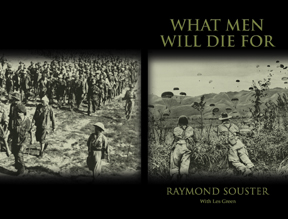


1.
Makes less sense
with every passing day.
2.
The unspoken honour among comrades.
3.
What ever is left of any honour
shared among comrades.
4. Soldier on
Work in Progress
Five years in the making
and we still struggle on.
We can't believe ourselves
how this monster has grown!
Raymond Souster was born in Toronto, Canada in
1921, the city also of his parents' birth. He attended local public schools,
graduating from Humberside Collegiate Institute in 1939. That same year he
joined the staff of the Imperial Bank of Canada (now CIBC), retiring with 44
years of service in 1984.
In 1947 he married Rosalia Geralde of Redcliff, Alberta, and
the couple celebrated their 60th wedding anniversary this year. Except for the
four years spent in the wartime RCAF as ground crew, he has lived all his life
in Toronto's west end.
In 1964 his volume of so-called collected poems, titled The
Colour Of The Times, won the Governor General's Award for Poetry in English, and
in 1969 he was co-winner of the first City of Toronto Book Award. In 1994 he was
made an Officer of the Order of Canada.
His Collected Poems in ten volumes are still available from
Oberon Press of Ottawa. In 2006, The Battered Silicon Dispatch Box published six
volumes; the three of poetry being Uptown Downtown, Wondrous Wobbly World and
Down to Earth; two reissues of novels, The Winter of Time, and On Target; and
one memoir titled Making The Damn Thing Work, detailing the first four years of
the League Of Canadian Poets.
Les Green, born in 1936 in Hamilton, Canada, spent
his childhood in southern Ontario, graduating from the University of Toronto in
applied mathematics in 1958. One of the pioneers of computing in Canada, he
participated in the design of many of the more innovative uses of this
technology in the 60's and 70's. After a six-year stint with the UN in Rome and
the OECD in Paris, he, his wife Marion and their four children returned to
Toronto, where he established a company to design educational software. This
experience was crystallized by Green and his partner, Kel Crossley, into a
how-to book for teachers, published in five languages in 1985.
Currently retired, he and his wife enjoy their eight
grandchildren, and their frequent sessions with their long-time neighbour Ray
Souster.
About This Book
Five years in the making, this narrative poem of 13,000 lines explores the epic
siege of Dien Bien Phu, in all its gallantry, horror and stupidity. It is aimed
at the average reader, but is also of interest to poetry fans and modern history
buffs, and perhaps even professional historians.
In What Men Will Die For the author has made use of a
multi-voiced poetic technique like that found in his Jubilee of Death (Oberon
1984), a retelling of the ill-fated Dieppe raid. In this new work, the voices
that we listen to, rendered in English but mostly drawn from French sources, are
intended to give a final impression of the supreme uselessness and stupidity of
war. Here you will meet, speaking for the side of the Viet Minh (abbreviated
from "League for the Independence of Vietnam"), that lifetime Communist
revolutionary leader, Ho Chi Minh, his one time university professor colleague
General Vo Nguyen Giap, academic historian turned military technician, and chief
medical advisor to Giap, Professor Ton That Tung. Speaking for the French, will
be noteworthy military figures such as generals de Tassigny, Salan, Navarre,
Gilles, Cogny, and de Castries, and battled-hardened field commanders including
Bigeard, Langlais and Séguin-Pazzis, not forgetting the mercurial one-armed
artillery man Colonel Piroth.
Where would a war be without its meddling politicians? In
this, France's "Dirty War," the revolving-door politicians of the Fourth
Republic bring additional confusion to the theme. The reader will sit in on
meetings with various presidents, prime ministers, cabinet ministers, and
envoys, in Paris, Washington and Vietnam.
In stark contrast to the blood-letting and horrors of close combat, you will
find in the filth of the underground hospital bunkers of Dien Bien Phu, Major
Doctor Paul Grauwin and his devoted associates, facing overwhelming challenges
as they work around the clock caring for the wounded and the dying from both
sides. And you won't be able to forget the air ambulance nurse Geneviève who
volunteered to stay behind in the doomed camp and work unceasingly to treat the
wounded and comfort the dying, and was rewarded with her country's highest
military honours.
Other Military Literature and Memoirs
Other Books by Raymond Souster